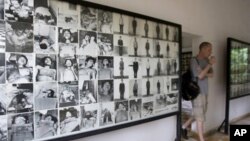Prosecutors at the UN-backed Khmer Rouge tribunal have issued a list of 96 witnesses to the court they would like to take part in second phase of a trial against two aging regime leaders.
The confidential list names those who would confront the leaders, Nuon Chea and Khieu Samphan, who are facing charges of atrocity crimes, including genocide, for their roles within the Khmer Rouge.
Officials say the witnesses would testify over crimes committed by the Khmer Rouge at various detention centers and work sites across the country.
Prosecutors want to include in the upcoming phase of the trial Tuol Sleng prison, the mass burial site at Cheoung Ek, the January 1 Dam and Kampong Chhnang Airport work sites, and the security centers of Au Kanseng and Phnom Kraol. They also want to examine genocide crimes against ethnic Vietnamese and Cham Muslim minorities.
Witnesses could include Cambodian citizens, journalists, civil servants, military personnel, local authorities and monks from across the country, according to a copy of court documents obtained by VOA Khmer. Seven experts, including two Americans and one Japanese, are hoped to testify. So is Kaing Kek Iev, better known as Duch, who ran Tuol Sleng prison and was sentenced to life in prison for his crimes by the tribunal, the documents say.
The court’s leading prosecutors, Chea Leang and Nicholas Koumjiang, submitted the confidential list to the tribunal on Dec. 11, ahead of tribunal meetings to determine the structure of the upcoming phase of the trial against Nuon Chea and Khieu Samphan.
Outside experts say the tribunal needs to act with haste, as the defendants age and the court struggles with a lack of funding from donors.
“If they fail to get a conviction within the lifetimes of the remaining two defendants, then the [tribunal] will serve as a cautionary tale on how not to conduct an international criminal trial,” said Peter Maguire, American author of “Facing Death in Cambodia.” “Good faith is dwindling, and so they better show some results very, very quickly, if they expect to get any more money.”
The UN leadership has “performed miserably,” he said. “The trial staff in Cambodia, they have done the best job that they could possibly do. But as I have said many times, the UN trial staff in Cambodia deserve a pat on the head, and the UN brass deserves a kick in the rear.”
Youk Chhang, a Khmer Rouge survivor and head of the Documentation Center of Cambodia, whose work has been integral to the tribunal process, told VOA Khmer the court has not worked cohesively on this case.
The tribunal “has not kept, explained, or maintained proper perspective,” he said. The court must now work more to satisfy both donors and victims that it will avoid “tedious” procedural problems, he said. However, the process is moving forward, which is a good sign, he said.
For Khmer Rouge survivor Sum Rithy, however, the court is moving too slowly in prosecuting the case.
“It has to do it now, in January 2014,” he said angrily by phone. “It should not be delayed. Whoever delays this case is an associate of the Khmer Rouge.”
Sum Rithy said he wants the tribunal “to understand the suffering of the victims who passed through this regime.”
“Let us know the truth, and don’t wait until we are dead to try them,” he said of the two leaders. “Many of the complainants have died ahead of the trial, such as my friends in Siem Reap. It is only I who has survived, and [the case] cannot be delayed any longer. If the court wants to find justice for the victims, it must do so now, right away.”
Tribunal officials met last week over the upcoming phase of the trial, but Trial Chamber judges say they cannot prepare for this phase while trying to render judgement on the first, completed earlier this year. Judgement in that phase—the case was separated in an attempt to expedite the process—is expected early in 2014.
Outside observers say the court does have the resources it needs to do both jobs, so long as it has the will.
Prosecutors Issue List of Potential Witnesses to Tribunal
- Sok Khemara
- VOA Khmer

WASHINGTON DC —






